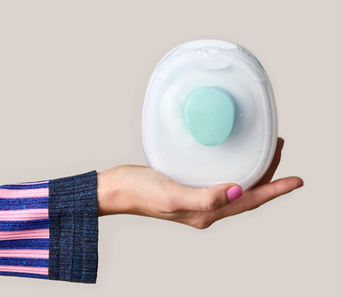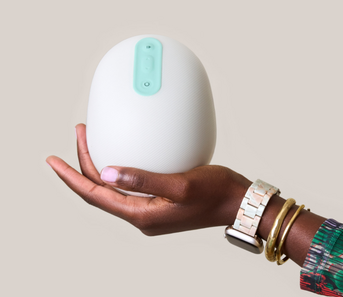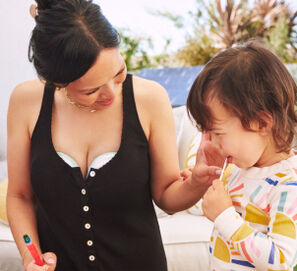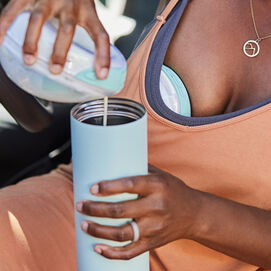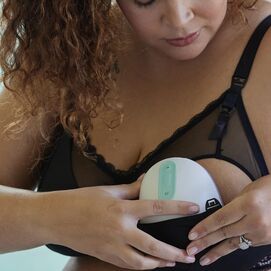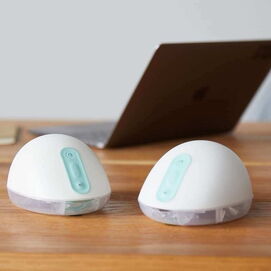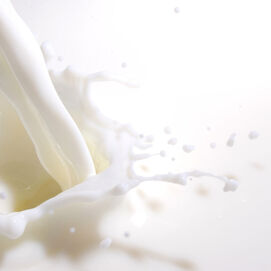Whether you’re headed out for a night with friends or planning a Netflix binge session, you might be wondering if you can enjoy a drink or two as a breastfeeding mama. The truth is, alcohol can be found in breast milk and may affect your baby when in large amounts. That’s why it’s important to remember that moderation is key.
Effects of Alcohol on Breast Milk
Can alcohol be found in breast milk? Yes. When you drink alcohol, it passes into your breast milk just like it does into your bloodstream. According to the CDC, alcohol levels are highest in breast milk around 30-60 minutes after you drink your beverage. Yet, it can be detected in breast milk up to 2-3 hours after consumption.
It’s also true that alcohol can be detected longer if you drink more. For example, if you drink two drinks, the alcohol can be detected for up to 4-5 hours.
How Much Alcohol Gets Into Your Breast Milk?
Research shows that the amount of alcohol in your breast milk will closely resemble the amount of alcohol in your blood. This means that if you have a blood alcohol level (BAC) of .08%, which is the legal limit, so will your breast milk. Alcohol is not stored in the breast, so as your liver metabolises the alcohol your blood alcohol level drops and so does the alcohol level in your breastmilk.
Effects of Alcohol on Your Baby
Alcohol can also affect your breastfed baby. Drinking five drinks or more can make it hard for your milk to let down and may even decrease your breast milk supply (more on this below). Unfortunately, this can result in the need to supplement with formula early, just so your baby gets enough milk and nutrients to grow.
According to the LactMed, heavy drinking can cause sedation, fluid retention and hormone imbalances in breastfed babies.
Drinking can also affect your baby’s sleep patterns. Studies have shown that babies experience less active sleep immediately after exposure to alcohol via breast milk than babies who are not exposed. Active sleep is the sleep that permits babies to store memories and learn, think of it is REM sleep. Cycling from active to deep sleep also plays a role in reducing SIDS.
At What Speed Do Babies Process Alcohol?
Babies can’t process alcohol as fast as adults can. In fact, they only metabolize alcohol at 25-50% of the rate adults do. This means that alcohol can stay in your baby’s system longer.
Effects of Alcohol on New Moms
The main effect of heavy alcohol consumption on breast milk is the threat of lowering your milk supply. Many studies show that alcohol decreases your hormonal response to your baby. And the CDC states that higher levels of alcohol consumption can interfere with letdown, making it more difficult for you to pump or feed. And over time, excessive drinking could lead to “shortened breastfeeding duration due to decreased milk production.”
Of course, drinking too much alcohol can also make it more difficult to care for your baby safely.
How Much Alcohol Is Safe to Drink?
Is there a safe amount of alcohol to drink? The CDC states that not drinking alcohol while breastfeeding is the safest option. Yet, moderate consumption or one drink per day is not known to be harmful to your baby. And most professionals agree that drinking small amounts of alcohol while breastfeeding won’t hurt your baby.
What qualifies as one drink will depend on the type of alcohol you’re drinking. According to the National Institutes of Health, one standard drink means:
12 fluid ounces of regular beer
8-9 fluid ounces of malt liquor
5 fluid ounces of table wine
1.5 fluid ounces of distilled spirits (gin, rum, tequila, vodka, whiskey, etc.)
Again, one standard drink per day isn’t known to have any negative effects on your baby. There haven’t been enough studies completed to have a definitive answer. Mama, only you know your limits and your comfort level. Enjoy that glass of wine or skip it—it’s up to you.
Is Pumping and Dumping a Way to Eliminate Alcohol?
Pumping and dumping is the process of pumping breast milk and getting rid of it. However, pumping and dumping does not speed up the elimination of alcohol from milk.
Remember earlier when we mentioned that alcohol works in your breast milk the same way it does in your bloodstream? This means that as long as there’s alcohol in your blood, there will be alcohol in your breast milk too.
If you feel the need to remove some milk due to engorgement, for your own comfort, do so. Or, if you will be missing a pumping session, feel free to pump to maintain your supply. Just know that there will still be alcohol present until your body fully metabolizes it so this milk should be discarded.
How Long to Wait After Drinking to Feed Your Baby
According to the American Academy of Pediatrics the occasional alcohol use equivalent to one drink per day may be acceptable and that waiting 2 hours after the last drink before breastfeeding or pumping is sufficient. To ensure complete elimination of alcohol from breastmilk, you can consult this table to determine length of time needed based on your weight and amount of alcohol consumed.
Planning Ahead
If you choose to drink, consider planning a breastfeeding or pumping session before taking that first sip. Then, you can feed or pump 2-3 hours later for the best outcome. Luckily, babies typically eat every 2-3 hours, which gives your body time to remove the alcohol from your system.
Medically Reviewed by: Dr. Michele Torosis, M.D.
Dr. Michele Torosis is a Stanford University-trained Obstetrician and Gynecologist. She is currently completing her fellowship in Female Pelvic Medicine and Reconstructive Surgery at UCLA, where she is receiving advanced training on pelvic floor disorders. She has a special interest in postpartum pelvic floor dysfunction including obstetric-related trauma. Dr. Torosis attended the University of California, Irvine for medical school and Duke University for her undergraduate education, graduating with a Bachelor of Science in Biomedical Engineering.
Prior to completing medical school, Dr. Torosis was involved in the early stages of Willow's product development. She worked one on one with new moms for Willow's first-in-woman clinical trial and assisted with early device prototyping. Through her practice, she has remained passionate about improving the breastfeeding experience for all women.


